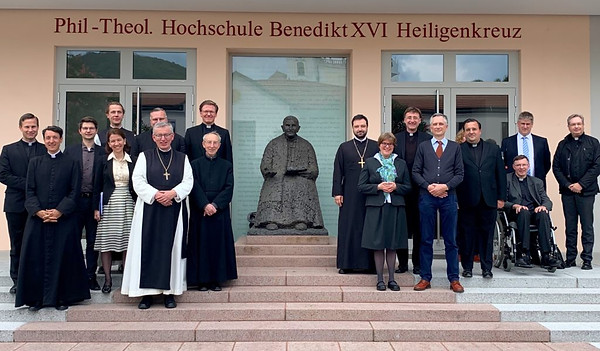HOW DO I UNDERSTAND THE BIBLE CORRECTLY?
Conference of the new student group in Heiligenkreuz 2019
How Do I Understand the Bible Correctly?
Exegesis and Theology in the Context of Benedict XVI's Jesus Books .
From June 1st to 2nd, 2019, the members of the new student group met at the Heiligenkreuz University of Applied Sciences for the national annual meeting. As a guest speaker, the Viennese Old Testament scholar Ludger Schwienhorst-Schönberger spoke about the relationship between historical-critical Bible research and theological interpretation.
report
Prof. Dr. Ludger Schwienhorst-Schönberger, as a proven expert, drew attention to a fundamental problem from which exegesis and theology suffer equally: it is about the question of what prerequisites must be met in order to understand the Holy Scriptures.
In principle, it is about a directional decision on which opinions - and exegetes - differ. Can the meaning of Scripture be revealed solely through academic study, supported by the historical-critical method, or is spiritual experience also necessary? If it is reduced to method, then theology runs the risk of being robbed of its soul.
The spiritual vacuum is then filled with other things, not infrequently this happens in the style of yoga, Zen, etc. The investigations have shown that Joseph Ratzinger / Benedict XVI. was aware of this problem and he resorted to canonical exegesis in order to bring science and spirituality back together.
Exegesis necessarily needs a spiritual dimension. Joseph Ratzinger already expressed this in his habilitation thesis when he wrote: "The writing was born of a mystical contact between the hagiographers and God, it can therefore only be properly understood on the basis of an exegesis that ultimately has to be called 'mystical'." This approach, which not only corresponds to the Fathers and the tradition of the Church, but was suggested to the whole Church above all by the Second Vatican Council (Dei Verbum), can be found in the Jesus books of Pope Benedict XVI. realized. They show a way that leads to the living and tangible Christ, to whom the theology, exegesis and the new student group of Joseph Ratzinger are committed.
Prof. Dr. dr Ralph Weimann

